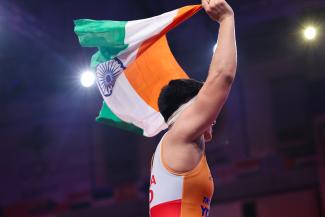LIVE BLOG: World Olympic Qualifier, Day Three
Saturday, May 8, 2021 - 06:55 By United World Wrestling Press

Wrestling enters day three in Sofia with Greco-Roman action and 12 Olympic spots on offer at the World Olympic Qualifier on Saturday.
14:47: The quarterfinals are getting started. See the below tweet for the upcoming match order.
SEMIFINALS (As they come in):
60kg
Dato CHKHARTISHVILI (GEO) vs. Victor CIOBANU (MDA)
Winner 423 vs. Hanjae CHUNG (KOR)
67kg
Parviz NASIBOV (UKR) vs. Winner 422
Winner 421 vs. Mamadassa SYLLA (FRA)
77kg
Aik MNATSAKANIAN (BUL) vs. Fatih CENGIZ (TUR)
Viktor NEMES (SRB) vs. Rafig HUSEYNOV (AZE)
87kg
Ivan HUKLEK (CRO) vs. Kristoffer BERG (SWE)
Davit CHAKVETADZE (RUS) vs. Zurabi DATUNASHVILI (SRB)
97kg
Vilius LAURINAITIS (LTU) vs. Artur OMAROV (CZE)
Nikoloz KAKHELASHVILI (ITA) vs. Alex Gergo SZOKE (HUN)
130kg
Elias KUOSMANEN (FIN) vs. Mykola KUCHMII (UKR)
Alin ALEXUC CIURARIU (ROU) vs. Rafal Andrzej KRAJEWSKI (POL)
3:37: Two-time world champion Metehan BASAR (TUR) will make his tournament debut in two matches on Mat C. He'll wrestle two-time Pan-American champion Luis AVENDANO (VEN).
13:19: I was going to say world silver medalist Rafig HUSEYNOV (AZE) is wrestling on Mat A, but before I could press send, he picked up the 8-0 shutout win over Gurpreet SINGH (IND). He'll take on Abd Elkrim OUAKALI (ALG) in the quarterfinals.
13 10: We'll see Rio Olympic champion Davit CHAKVETADZE (RUS) for the first time in two matches. He'll take on Asian champion Kumar SUNIL (IND) in Bout 360 on Mat B.
12:44: World champion Mélonin NOUMONVI (FRA) is making his way to Mat A. He'll square off against Vladen KOZLIUK (UKR). #WrestleSofia
12:25: Norweigan European champion Felix BALDAUF will wrestle Seungjun KIM (KOR) in four matches on Mat A.
12:07: Rio Olympic bronze medalist Stig-Andre BERGE (NOR) is wrestling on Mat B.
11:35: World champion and Rio Olympic bronze medalist Rasul CHUNAYEV (AZE) is wrestling Donior ISLAMOV (MDA) on Mat A.
11:24: Four-time world medalist Almat KEBISPAYEV (KAZ) picked up a 5-3 opening-round win over Anthony PALENCIA PUENTES (VEN). The Kazakh two-time Olympian led 5-0 but surrendered three unanswered points and hung on to the two-point victory.
11:01: Datunashvili needed a little over two minutes to score the 9-0 win over Kim.
11:00: Aik MNATSAKANIAN (BUL) picked up a big one-point win over two-time European champion Daniel CATARAGA (MDA) and moved into the 1/8 finals. He'll wrestle Georgios PREVOLARAKIS (GRE) next.
10:35: Reigning European champion Zurabi DATUNASHVILI (SRB) is coming up next on Mat A. He's wrestling Korea's KIM Jinhyeok.
10:25: Viktor NEMES (SRB) is making his way to Mat B to take on Matias Olavi Iisakki LIPASTI (FIN)
10:00: Whistles are off in Sofia! 12 Olympic spots are on the line on Saturday.


Share your thoughts.
Comments